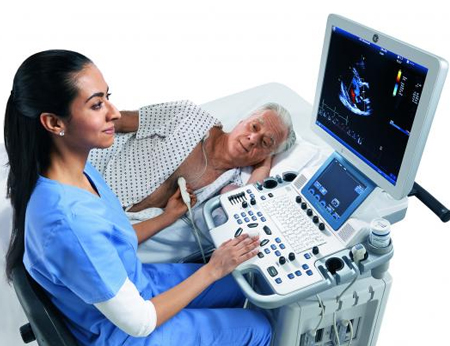Echocardiography (Adult, Paediatric And Neonatal)

Echocardiography or ECHO is a diagnostic technique that uses soundwaves to generate the images of the heart which help the doctors to determine whether your heart is pumping blood properly as well as to detect or identify a wide gamut of heart conditions and problems like hypertrophic cardiomyopathy and dilated cardiomyopathy. ECHO can also be performed to calculate cardiac output, ejection fraction and diastolic function. Since the procedure is non-invasive, it does not have any risks or side effects. It is due to this very reason that the test can also be performed on small children and infants.
Why is ECHO performed?
ECHO is usually recommended for any of the following reasons:
- To check for any abnormalities in the heart valve or chambers
- To determine the cause of angina and breathlessness
- To detect congenital heart diseases and defects
- To detect abnormal heart rhythms i.e. arrhythmia
- To detect structural abnormalities in the aorta
- To check for clots in the heart.
- To determine the pumping strength of the heart
- To measure the size of the heart
Types of Echocardiogram
There are various different types of echocardiogram. These include:
Transthoracic Echocardiography – It is the most common type of echocardiogram. The procedure is completely painless owing to the fact that it is non-invasive. A gel is applied on the patient’s chest and a transducer is used to send soundwaves to the heart by gently pressing it against the skin and moving it back and forth. These waves bounce back creating echoes which are converted into moving images by a computer. Usually, there is no need of using contrast material, however, if the patient’s ribs or lungs are preventing the doctor from having a proper view, they might administer the same.
Transoesophageal Echocardiography – Doctors usually recommend transoesophageal echocardiography when transthoracic echocardiography does not produce any definitive images. Unlike the latter, in which the transducer is simply placed on the chest and moved, it involves the use of much smaller transducer which is introduced inside the patient’s body via the mouth. The patient’s throat will be numbed using sedatives, such that he/she does not feel any pain or discomfort. The transducer produces the soundwaves and records the echoes which are then converted into moving images.
Doppler Echocardiogram – Doppler technique is used in both transthoracic echocardiography and transoesophageal echocardiography. Doppler echocardiogram helps the doctors to measure the pace and direction of blood flow in the major blood vessels of the body and can also help to detect problems that are not usually detected by the traditional ultrasound.
Stress Echocardiogram–It works on the principle that certain heart problems escalate or become more visible during physical exertion. The procedure is usually performed to detect and evaluate problems related to the coronary artery. If the patient is not in a state to exert naturally, the doctors may administer some medication to make your heart beat at a faster pace.
Three-Dimensional Echocardiography – As the name suggests, three-dimensional (3-D) echocardiogram helps to generate a3-D image of your heart using transoesophageal or transthoracic echocardiography. Multiple images are captured from various angles and put together to form a complete image.
Fetal Echocardiography – The procedure is performed on expecting mothers to detect any abnormality in the heart structure or function of the unborn baby. Since the procedure does not involve the use of any radiation. It is completely safe.
Necessary precautions before the test
The procedure does not require any prior preparation. Usually, the patient is not required to fast and can eat and drink normally, however, in the case of transoesophageal echocardiogram, you might be required to fast for a few hours prior to the test.
Risks
Echocardiography is a Completely Risk - free procedure as it does not involve any incision or medication. In case the contrast material is used, there are slight risks of allergic reactions in some patients. Patients undergoing stress echocardiogram might experience slightly elevated heartbeat for some time, however, the problem is temporary.


